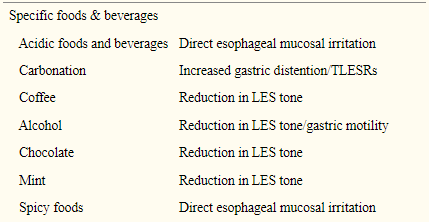
Heartburn Relief
You might need heartburn relief if you have pain in your chest after a meal, have sour burps that contain food or liquid, have a lingering bitter taste in your mouth, or feel like there’s a lump in your throat. An estimated 15 million Americans seek heartburn relief daily! But before you pop a pill, consider these strategies.
Remove Foods Known to Weaken your Sphincter
Above your stomach and below your esophagus is a muscle called the Lower Esophageal Sphincter or LES. Keeping it toned is important for heartburn relief. If you went jogging with a bag of gold, you would want to make sure that you had a tight drawstring to prevent the coins from escaping. Similarly, you want your LES to remain closed when your churning stomach is filled with food. Your throat is not coated with an acid-resistant lining like your stomach is. So contact with stomach contents hurts!
Studies have shown that the following foods relax the LES. Then it does not remain securely shut.

The most common acidic food to bother Americans is cooked tomatoes (e.g. tomato sauce or tomato paste).
Don’t Overfill the Washer
Just like a washing machine, your stomach needs to be able to agitate freely. If you stuff it to the brim, it’s most likely going to slosh some of the contents where they don’t belong. Sometimes more is less. In this case, effective digestion means stopping when you are satisfied. Because if digestion doesn’t occur efficiently, gas and pressure will build up. Your body is elegantly designed to blow the LES in a case like this instead of letting the inadequately-liquified food move into the small intestines, where if would create further digestive distress.
Chew on This
Did you know that there are digestive enzymes in your saliva? The more you chew your food, the less your stomach has to. Further, the mechanical action of your teeth helps convert food to a fluid form for absorption. Food that has been very well chewed is less likely to spend long periods in the stomach. That means it is less likely to go sour and gas off, putting undue pressure on your LES.
Try this experiment: Start with a bite of food half the size or your normal bite and chew until the food is the consistency of applesauce or pudding. Do your notice a flavor change? Many foods, especially carbohydrates, will increase in sweetness the more you chew.
Augment Digestive Secretions
Breaking down proteins and dissolving minerals so that you can absorb them into your bloodstream requires more, not less, stomach acid. When the pH of your stomach is similar to a battery, the digestive process runs smoothly, as designed. But as a culture, many things we do curtail the stomach acid production. You can support more effective digestion for heartburn relief by practicing the following techniques consistently.
- Stay hydrated. Stomach acid is, after all, a fluid. The body cannot make fluids out of thin air. Since your body is eloquently intelligent, it will prioritize blood manufacture over stomach acid synthesis. That make sense, because blood is more critical in the short run to your survival.
- Engage in regular practices to dissipate stress throughout the day. You cannot be in two nervous system modes simultaneously. Rest-and-digest simply is not compatible with fight-or-flight. If you are uptight, deadline-focused, task-oriented, and performance-driven, your body will divert resources away from digestion on purpose! You must breathe deeply, be present, and calm yourself if you hope to have adequate digestive secretions.
- Don’t dilute your meals. Sure, it’s fine to have a sip of water with your food. But don’t depend on your beverage to moisten your food and wash it down. That’s what saliva is for! It is best to drink most of your water between meals. If your food seems too dry, chew it more!
Use Caution with Commercial Heartburn Relief
You’re not likely to find a long-term solution to a chronic heartburn problem by buying an over-the-counter product. After all, heartburn is not a deficiency of Prilosec! There are several issues with reducing your stomach acid regularly for a chronic reflux problem.
First, as mentioned above, you require good acidity to break down, or denature, proteins. Imagine that you have a big ball of yarn that you need to snip into little pieces. It would make sense for you to unravel the ball before trying to cut it. Preparing proteins for your use works similarly. First, your body has to unravel, or denature, the strand. Then it breaks that strand into amino acids that can be used to build bones and muscles, make blood cells, create antibodies, or synthesize hormones. Denaturing occurs in a high acid environment.
Second, you need adequate stomach acid to absorb vitamin B12. This vitamin is important to sustain your energy, boost your mood, prevent memory loss, and maintain heart health. The cells that release stomach acid also release Intrinsic Factor, an essential component that binds to B12 so that you can absorb it. Suppress stomach acid and you suppress Intrinsic Factor.
Third, “it takes a lot of acid to dissolve a rock.” Minerals just are not bioavailable to you in a low-acid environment. The calcium for bones & teeth, potassium for heart health, magnesium for anxiety, iron for red blood cells, and zinc for immunity require that you not block stomach acid long-term.
Finally, bile and enzyme secretion depend on high acidity. Good digestion isn’t just about the stomach. You also need enzymes from the pancreas and brush border of the intestines, and bile from the liver. But these are triggered by a very acid pH when the stomach dumps its contents into the duodenum.
So, using a product that you have seen advertised may bring short-term symptomatic heartburn relief, but may create further health problems downstream.
Still Need Help?
Sometimes there are food sensitivities, anatomical abnormalities, or nutrient deficiencies at play that prevent you from getting heartburn relief. I have tools to do the detective work, so you can get the the bottom of your problem. Reach out today if you want a more detailed work up to figure out your unique triggers.
